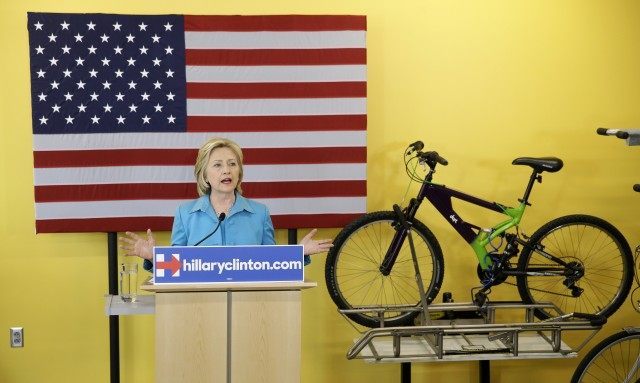DES MOINES, Iowa (AP) — Calling climate change one of the “most urgent threats of our time,” Hillary Rodham Clinton laid out elements of a sweeping plan Monday that would see every U.S. home powered by renewable energy by 2027, even as she declined to take a position on the Keystone XL oil pipeline opposed by environmental activists.
The Democratic presidential candidate called for installing 500 million solar panels by 2020 as part of a plan she likened in its ambitions to President John F. Kennedy’s moonshot in the 1960s.
“I know these goals will test our capacities, but I know they are within our reach,” Clinton said after touring a regional bus station that was built using some recycled materials and uses solar panels and rainwater to save energy.
But Clinton again would not be pinned down on the Keystone XL oil pipeline, the $8 billion project that would transport oil from Canada’s tar sands to refineries on the Gulf of Mexico. Environmentalists say the project would contribute to global warming by distributing dirty oil. Clinton said she wanted a State Department review started when she was secretary to run its course.
“I put together a thorough, deliberative, evidence-based process to evaluate the environmental impact and other considerations on Keystone,” said Clinton. “I’m confident that the pipeline’s impact on global greenhouse gas emissions will be a major factor in that decision, as the president has said.”
Climate change has become a key issue in the Democratic presidential primary, where Clinton is the heavy favorite. Billionaire Tom Steyer has led an effort to promote the issue. The California-based Steyer raised money for Clinton in May.
Environmental groups praised Clinton for setting the goals but said they wanted to see details and a conviction that she would follow through.
Bill McKibben, an environmental activist and the co-founder of 350.org, said Clinton was “half the way there” but needed to show she understood “the other half of the climate change equation” by standing against fossil fuel projects like offshore and Arctic drilling, coal leasing in the Powder River basin in Montana and Wyoming — and the Keystone XL pipeline.
“Growth in renewables doesn’t mean enough if we’re simultaneously kicking the decarbonization can down the road with more pipelines and more extraction on public lands,” McKibben said.
Surveys released last week by Quinnipiac University in three potential presidential battleground states — Colorado, Iowa and Virginia — found that more than 6 in 10 voters in each state think climate change is caused by human activity, siding with the widespread scientific view that some Republican candidates challenge. Yet less than 45 percent in each state called climate change a moral issue, as it was defined by the pope in his recent encyclical.
Among Clinton’s 2016 opponents, Vermont Sen. Bernie Sanders has been vocal about the need for action to curb climate change and former Maryland Gov. Martin O’Malley released a plan in Iowa several weeks ago that deals not just with consumer energy use, but also industrial and transportation, as he aims to make the U.S. entirely powered by renewable energy by 2050.
Both Sanders and O’Malley oppose the pipeline. O’Malley’s deputy campaign manager, Lis Smith, said in a statement Monday that “every Democrat should follow his lead and take a stand to commit to ending our reliance on fossil fuels.”
Clinton declined to specify how she would pay for her proposal, telling reporters that while there would be some upfront costs, “A lot of these changes will pay for themselves.” As a presidential candidate in 2007, Clinton called for implementing a market-based system to reduce carbon pollution by capping overall emissions and letting companies trade pollution credits. But she made no reference to that kind of approach.
One of Clinton’s current proposals would create a “Clean Energy Challenge,” which would set up competitive grants for states, cities and communities that pursue renewable energy projects.
Clinton spokesman Brian Fallon estimated the 10-year cost of the grant program would be $60 billion, which he said would be offset by raising taxes on the oil and gas industry.
___
Thomas reported from Washington.
___
This story has been corrected to reflect that $60 billion is the estimated cost of proposed grants, not Clinton’s overall energy plan.

COMMENTS
Please let us know if you're having issues with commenting.